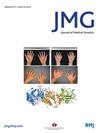Genetic evidence for splicing-dependent structural and functional plasticity in CASK protein
IF 3.5
2区 医学
Q2 GENETICS & HEREDITY
引用次数: 0
Abstract
Background Pontocerebellar hypoplasia (PCH) may present with supratentorial phenotypes and is often accompanied by microcephaly. Damaging mutations in the X-linked gene CASK produce self-limiting microcephaly with PCH in females but are often lethal in males. CASK deficiency leads to early degeneration of cerebellar granule cells but its role in other regions of the brain remains uncertain. Method We generated a conditional Cask knockout mice and deleted Cask ubiquitously after birth at different times. We examined the clinical features in several subjects with damaging mutations clustered in the central part of the CASK protein. We have performed phylogenetic analysis and RT-PCR to assess the splicing pattern within the same protein region and performed in silico structural analysis to examine the effect of splicing on the CASK’s structure. Result We demonstrate that deletion of murine Cask after adulthood does not affect survival but leads to cerebellar degeneration and ataxia over time. Intriguingly, damaging hemizygous CASK mutations in boys who display microcephaly and cerebral dysfunction but without PCH are known. These mutations are present in two vertebrate-specific CASK exons. These exons are subject to alternative splicing both in forebrain and hindbrain. Inclusion of these exons differentially affects the molecular structure and hence possibly the function/s of the CASK C-terminus. Conclusion Loss of CASK function disproportionately affects the cerebellum. Clinical data, however, suggest that CASK may have additional vertebrate-specific function/s that play a role in the mammalian forebrain. Thus, CASK has an ancient function shared between invertebrates and vertebrates as well as novel vertebrate-specific function/s. Data are available upon reasonable request.CASK 蛋白剪接依赖性结构和功能可塑性的遗传学证据
背景 桥小脑发育不全(PCH)可能表现为脑室上部表型,并经常伴有小头畸形。X连锁基因CASK的损伤性突变会导致女性患者出现自限性小头畸形和PCH,但男性患者往往是致命的。CASK 缺乏会导致小脑颗粒细胞早期变性,但其在大脑其他区域的作用仍不确定。方法 我们产生了条件性 Cask 基因敲除小鼠,并在出生后的不同时期将 Cask 无处不在地删除。我们研究了几例 CASK 蛋白中心部分存在损伤性突变的受试者的临床特征。我们进行了系统发生学分析和 RT-PCR 分析,以评估同一蛋白质区域内的剪接模式,并进行了硅结构分析,以研究剪接对 CASK 结构的影响。结果 我们证明,成年后小鼠 Cask 的缺失不会影响存活,但会随着时间的推移导致小脑退化和共济失调。耐人寻味的是,已知有损伤性半杂合子 CASK 基因突变的男孩会出现小头畸形和大脑功能障碍,但不会出现 PCH。这些突变存在于两个脊椎动物特异的 CASK 外显子中。这些外显子在前脑和后脑中均可进行替代剪接。这些外显子的加入会对 CASK C 端的分子结构产生不同的影响,进而可能影响其功能。结论 CASK 功能的丧失对小脑的影响尤为严重。然而,临床数据表明,CASK可能具有其他脊椎动物特有的功能,在哺乳动物前脑中发挥作用。因此,CASK具有无脊椎动物和脊椎动物共有的古老功能以及脊椎动物特有的新功能。如有合理要求,可提供相关数据。
本文章由计算机程序翻译,如有差异,请以英文原文为准。
求助全文
约1分钟内获得全文
求助全文
来源期刊

Journal of Medical Genetics
医学-遗传学
CiteScore
7.60
自引率
2.50%
发文量
92
审稿时长
4-8 weeks
期刊介绍:
Journal of Medical Genetics is a leading international peer-reviewed journal covering original research in human genetics, including reviews of and opinion on the latest developments. Articles cover the molecular basis of human disease including germline cancer genetics, clinical manifestations of genetic disorders, applications of molecular genetics to medical practice and the systematic evaluation of such applications worldwide.
 求助内容:
求助内容: 应助结果提醒方式:
应助结果提醒方式:


